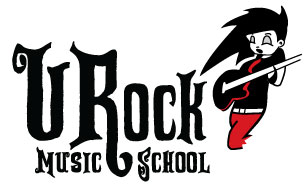Playing music is awesome, fun and rewarding. Learning to play music, however, can be hard work.
Here are some tips for success if you are enrolling you child in music lessons. You can skip down to the next section During lessons, if your child or teen is already attending lessons with us:
Before enrolling
- Assess your child’s readiness. We find that by age 7, most kids are ready for music lessons provided they have good reading skills and can concentrate on focused activities for at least 30 minutes. Before the age of 7, your child might find group lessons – such as our U-Rock Kidz Band & Pop Patrol programs – more rewarding. Seven-year-olds are particularly suited to singing, piano and ukulele lessons. Drums and guitar, which are more physically demanding, may be best for children 8 and over.
- Set expectations. It looks cool when a musician wails on a guitar or goes wild in a drum solo, and that can prompt kids to want to learn to play. If your child is asking for music lessons, make sure they understand that musicians work hard to learn their craft. It will take some time – even years – before they play a good guitar, piano or drum solo. Your kids must understand that they need to practice each and every day. We usually recommend that children under 10 practice for 15 minutes daily. Pre-teens (age 11-12) and teens 13+ should practice at least 30 minutes EACH day, including weekends.
- Get a good instrument. A poor quality instrument will be difficult to play and frustrating for little rock stars. Ensure your child’s instrument is in good shape and is the right size. Half and three-quarter size guitars are available for children. Guitars should have steel strings, and drum students need a standard five-piece drum kit (Either acoustic or electronic kits are fine). Plastic guitars, octo-pads and anything from a toy store are unsuitable for private lessons. keyboards and electric pianos vary in price, so buy the best quality your budget allows for. We’d be happy to recommend instruments, and the best places to buy them, to parents of all new students. Just ask!
During lessons
- Encourage good practice routines. Students will better remember to practice if they do it at the same time each day. Practice should include lots of repetition: encourage them to repeat songs and exercises until they get them right.
- Remind them to practice daily. If your child is under 13, you’ll need to remind them to practice. Some days it will be a struggle, no question. By the time they are teens, they should be self-motivated. If teens aren’t practicing on their own, you may wish to try another instrument as no amount of coercing will help if they aren’t enjoying what they are learning. This is very important to us at U-Rock.
- Learn with them. Our experience is that young kids learn best when their parents work with them. Keep them company while they practice (when you can), be present and encourage them to learn. Set a timer, offer small rewards for success, and praise them when they do well.
- Expose them to LOTS of music. Help your child love music by playing it at home, in the car … basically, wherever you can. Some of our students’ most cherished memories are singing along with mom or dad in the car. The greater the variety of music they listen to, the better. It opens up all kinds of options for them to love.
- Take advantage of performing opportunities. Performing builds confidence and self-esteem, which will serve them well in all parts of their lives. Children as young as six have performed at our concerts and open mic events and made their parents proud. We offer 6 live shows/concerts and open mics per school year – so your rock stars have LOTS of opportunities to shine, once they are ready.

